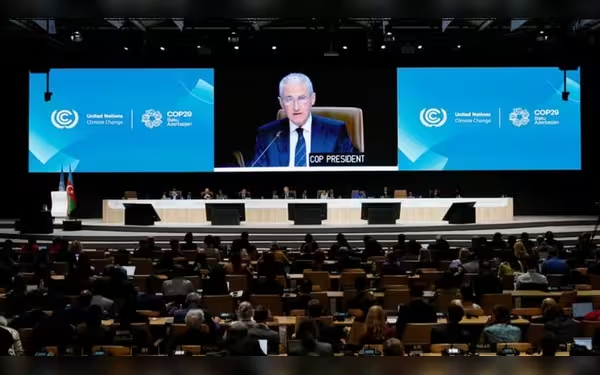Sunday, December 22, 2024 07:51 PM
COP29 Summit: Business Demands Clarity Amid Climate Finance Pledges
- COP29 promises $300 billion in climate finance by 2035.
- Businesses seek 'investment ready' climate plans by February.
- New revenue streams discussed to attract investments.
 Image Credits: channelnewsasia
Image Credits: channelnewsasiaCOP29 summit highlights business demands for clear climate plans and $300 billion finance commitment by 2035.
In recent discussions surrounding climate change, the COP29 summit held in Baku has emerged as a pivotal event. The conference focused on the urgent need for countries to present clear climate plans that can attract significant investments. With the world grappling with the effects of climate change, the business sector is keenly interested in how these plans will unfold, especially in light of mixed messages regarding the transition from fossil fuels.
During the summit, a notable agreement was reached, promising $300 billion in annual climate finance by 2035. However, many developing nations expressed concerns that this amount would not suffice to support their ambitious climate goals. The private sector's involvement was highlighted, with a commitment to mobilize $65 billion annually through a multilateral development bank. Yet, the effectiveness of these pledges hinges on the specifics of the plans that countries will submit.
Countries are expected to present their national climate plans by February, but many have indicated they may miss this deadline. Businesses are urging that these plans include projects that are "investment ready" and provide detailed information to help investors assess long-term risks. Thomas Tayler, head of climate finance at Aviva Investors, emphasized that financial flows will only begin once the goals set at events like COP29 are translated into concrete regulations and policies.
The backdrop of the summit was complicated by the recent U.S. presidential election, where Donald Trump, known for his climate skepticism, emerged victorious. This development raises concerns about the future of climate finance from the United States, which is the world's largest economy. While COP29 set a new climate finance target, the commitment to prioritize vulnerable nations is a step forward, albeit with challenges ahead.
Moreover, discussions at the summit included exploring new revenue streams, such as global taxes on polluting industries and financial transactions. These initiatives could potentially make infrastructure projects more attractive in regions that are often seen as risky for investment. However, the ongoing war in Ukraine and the resulting energy crisis have already slowed the green energy transition, with major companies reassessing their commitments to sustainability.
Despite these challenges, COP29 did provide some positive developments, particularly for companies involved in carbon removal projects. An agreement was reached to establish rules for trading national carbon offsets, which includes creating a central registry to track these credits. This clarity is expected to encourage investment while addressing concerns about reputational risks associated with carbon credits.
While COP29 has laid the groundwork for future climate finance and investment, the path forward is fraught with challenges. The influence of fossil fuel lobbies and the need for concrete, actionable plans remain significant hurdles. As the world looks ahead to COP30, it is crucial for countries to demonstrate their commitment to meaningful progress in combating climate change. The stakes are high, and the time for decisive action is now.













